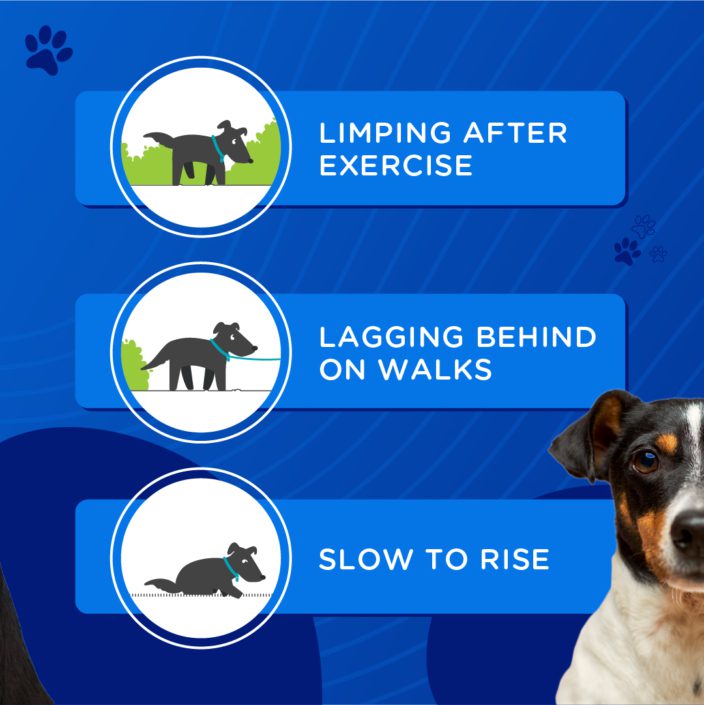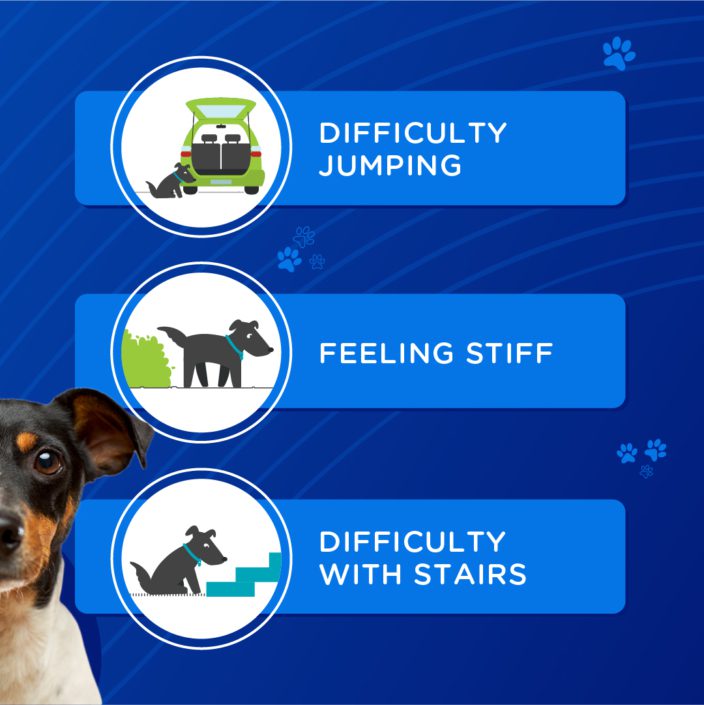Dr. Tom Cannon , MVM
Veterinary Surgeon Rockhall Veterinary Ennis Road Vets.
Osteoarthritis is very common in small animals, affecting between 20-50% of dogs and cats at some point in their lives. It is a chronic condition causing degeneration within the joints and can involve cartilage, bone, tendons and ligaments. Osteoarthritis causes pain and inflammation, and is a progressive, incurable condition, meaning it can have a severe impact on your pet’s quality of life. There is often an underlying issue leading to the development of osteoarthritis, which may cause it to be seen earlier in life. These causes can include but are not limited to; hip or elbow dysplasia, cruciate ligament disease, patellar (knee-cap) luxation or joint injuries.
How will I know if my pet has osteoarthritis?
- Because pets don’t always overtly show pain, the first signs owners may notice include stiffness, lameness, slowing down on walks, playing less, behavioural changes and a reluctance to jump or climb (this is particularly true of cats)
- Lameness or stiffness may be more noticeable after exercise or getting up in the morning
- Painful or swollen joints
- Loss of muscle mass
- Reduced appetite
- Difficulty settling into bed and finding a comfortable position either sitting or lying down, restlessness
- Licking their joints


How can osteoarthritis be treated?
As there is no cure for osteoarthritis treatment is aimed at allowing pets to use affected joints without pain and maximise quality of life. Treatment should always be tailored to individual patients and in most cases, a multi-modal approach is best.
Treatment options can include:
- Pain relief; as osteoarthritis is painful, in most cases providing pain relief is the most important part of treatment. There is a range of medications that can be used and again will be tailored to individual patients. Your vet may recommend an annual blood test if your pet is going to be on long-term medication
- Weight loss; pets that are an ideal weight are likely to have fewer painful episodes and slower progression of clinical signs. Being overweight places additional stress on joints and can greatly exacerbate osteoarthritis
- Exercise; in most cases, regular, moderate exercise is important for healthy joint function. Your vet may advise you on the length of walks and types of walking surface to utilise.
- Surgical procedures may be indicated in some patients with osteoarthritis. Early diagnosis and subsequent surgical management of underlying conditions like cruciate ligament disease, patellar luxation, and elbow dysplasia can markedly improve both short and long term joint function.
- Joint supports can provide stability and reduce discomfort from osteoarthritis in certain joints.
- Complementary treatments such as physiotherapy, hydrotherapy, and acupuncture can be used to build muscle, improve joint mobility and reduce muscular pain and stiffness. Did you know that at Rockhall Veterinary we can offer Veterinary Acupuncture? Call us on 061333033 for more information.
- Joint supplements containing glucosamine, chondroitin and green lipped mussel extract can promote healthy joints and help complement osteoarthritis treatments. At Rockhall Veterinary we recommend YuMove Advance 360 for Dogs https://rockhallveterinary.ie/product/yumove-advance-360-for-dogs/
- Diets containing omega-3 fatty acids can have a natural anti-inflammatory effect, providing relief from the discomfort associated with osteoarthritis
- Environmental changes; there are a number of simple changes you can make at home to help make life with osteoarthritis more comfortable for your vet, these include:
- Providing a comfortable sleeping environment, ideally with an orthopaedic or memory foam bed. This can improve rest, improve posture, support blood and lymphatic circulation and reduce the incidence of calluses and bed sores. At Rockhall Veterinary we recommend Balto dog beds https://rockhallveterinary.ie/product/balto-orthopedic-mattress-for-dogs/
- Providing raised food and water bowls can reduce back and neck pain and reduce pressure on joints during feeding or drinking. The ideal height for bowls is between your dog’s elbow and shoulder level
- Providing plenty of non-slip surfaces and reducing the amount of time spent on slippery floors. Rugs or mats with non-slip undersides or interlocking foam squares can be utilised to give your dog more traction on the floors in the home
- Using a ramp will reduce the stress placed on joints entering and leaving a car

If you are concerned about your pet, give us a call on 061314203.

